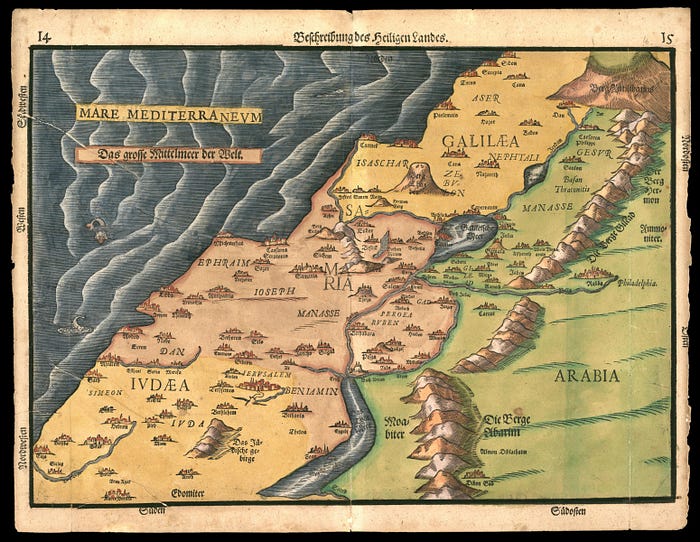Is Israel, in Its Pain, Losing Its Moral Compass?

A “tragic lack of imagination,” wrote Franz Kafka, occurs when pain is so great that it prevents one from acknowledging the pain of others, from even seeing it exists. All sympathy with the Other stops; so does relating. Tragedy inheres in the compounding of unfeeling. This is when atrocity happens: With sympathy gone, smiting the Other becomes all too possible, even cathartic. Kafka believed this lack of sympathetic imagination explained History’s unending tragedy: Humanity on both sides loses.
Is this the case with Israel at this moment…?
October 7 — the infamous day when Hamas extremists sundered the storied Israeli security perimeter and slaughtered 1,200 Israeli men, women, and children, taking 240 hostages as bargaining chips— shocked a world seemingly inured to further shock. Especially vicious: Hamas’ desecration of Israeli dead and the beheading of Israeli babies. Immediately, October 7 entered modern Jewish history as “a day like no other,” as the headlines put it, cast as the worst atrocity visited on Jews since the Holocaust, leading now to a war “like no other.”
Since that searing day, we read of Israelis’ mass traumatization, all understandable — the unending replay of that day’s horrors; the hostages’ families pleading with their heedless government to prioritize their beloveds as Israel shifted to all-out war. Israeli news is filled with testimonials of returned hostages and funerals of the military dead. The massive protest movement that, pre-war, blocked prime minister Benjamin Netanyahu’s antidemocratic efforts to subvert the courts (he is under three indictments for corruption), shut down all protest — all protest — to come to Israel’s defense in its existential crisis.

Now we hear of the sexual violence Hamas inflicted on Israeli women and girls that horrific day, with Israeli voices wondering why the United Nations gives so little attention to it. Media reports circulate of Israelis, once sympathetic with the Palestinian cause, now not, breaking with old Palestinian friends and colleagues. Israel’s military shows a 45-minute video of Hamas’ depredations to visiting officials and journalists, arguing for the primacy of Israel’s trauma.
Feeling becomes unfeeling, and the unfeeling compounds — in lamentation, in insistence on the supremacy of one’s own pain: the predicate for Kafka’s “tragic lack of imagination.”
One wonders: Does this account for the inability of the Israeli public — not the anti-Palestinian right, but the more open and embracing left — to acknowledge, even to see, the pain Israel now wreaks on innocent Palestinians in Gaza? The smiting of the Palestinians, the laying waste to Gaza — the Biblical verbs seem apt — seem not to impinge. The world grieves for the Palestinians; the Israelis largely do not. Jews, by their tragic history, know suffering; do they not see they cause it now?
Stakes could not be higher. The tragedy-in-the-making here is: Netanyahu, for nefarious personal reasons, is manipulating a profoundly traumatized public and directing it onto a path — in a misguided, extended, and perhaps widened war — that, morally, will ultimately redound to the shame both of Israel and its people.

For what the world sees, but the Israeli public may or may not: Israel Defense Forces (IDF) are bombing “safe areas” and refugee camps (also here), ordering Palestinians to move south and then bombing those areas. Over 22,000 Palestinians have been killed; mass starvation looms; Gaza is one vast ruin. World opinion has turned against Israel, to Israelis’ mystification. The problem may be image control: According to The Christian Science Monitor, Israeli TV coverage of Gaza shows only “vast scenes of destruction, but few people and no close-ups of dead bodies.” Admirers of Israel worry it is sacrificing its moral mantle, risking prosecution for war crimes. Already the Israel-Hamas war is one of the most destructive in modern times — an extraordinary fact, given Russia’s intent to raze Ukraine and America’s “shock-and-awe” assault on Iraq.
Note: Of course — of course! — Hamas has itself committed war crimes, notably October 7. And Palestinians, who must be distinguished from Hamas, too often succumb to hatred of the Jews. My focus here is the Israeli people — because, unlike the powerless Palestinians, only the Israeli people have the power to direct this war’s outcome in a constructive and humane direction.
Can they? Will they?
Some voices in the Israeli commentariat are bravely appealing to the Israeli public. I say “bravely,” because when things get tribal, as they do in a war for survival, it is beyond brave to put tough questions, especially moral questions of right and wrong, to your own tribe. Early on, these voices directed their critique at Netanyahu, now it is fellow Israelis they address.

Notable is Amira Hass, columnist at the leftist newspaper Haaretz, who asks pointedly: “What enables the majority of Jewish Israelis to support this systematic and mass erasure?” I will quote her at length, because her recent column — “Israel Killed Thousands of Children in Gaza. How Can So Many Israelis Remain Indifferent?” — is one long cri de coeur. She begins:
“Gaza Strip is gradually being erased, along with its families, its people, its children, their smiles and laughter. What enables the majority of Jewish Israelis to support this systematic and mass erasure? What enables them to see it as the only suitable response to the massacre that Hamas….perpetrated?”
Noting the IDF’s destruction of refugee camps and Palestinian culture, Hass goes for the core:
“What enables the majority of Jewish Israelis to remain unshocked by the fact that in about two months we’ve killed around 7,000 children…? What enables most of the Jews not to gasp in horror at the crowding [of almost 2 million] people into a ‘safe area’ that’s constantly being bombed? What’s preventing those Jewish Israelis from screaming when they hear about the thirst and hunger of [the 2 million] Palestinian civilians and diseases spreading due to crowding, water shortage and out-of-action hospitals? What enables this erasure and slaying of children with both our active and passive participation?”
Bravely, to her tough questions, Hass submits answers:
“For decades we’ve been educated to believe that only military force can ensure the state’s survival and ability to flourish, while denying rights to the Palestinian people… We Jews have assumed a monopoly on suffering caused by the cruelty of the Other…. We’ve chosen not to look at the unbearable pictures of trembling Palestinian children, faces gray with dust, being rescued from between bombed concrete walls…. Every….killing that we’ve been carrying out against the Palestinians for years, every theft, humiliation and abuse passes through thousands of media, psychological and academic filters. The sifted product is our conviction that Palestinians are better off…, so they shouldn’t complain….”
She goes on with her truth-telling:
“We remember every massacre of Israelis by Palestinians. We forget every massacre of Palestinians by Israelis…. For decades we’ve gotten used to living in comfort while five minutes away Israel demolishes Palestinian homes and builds for Jews, channels water to Jews and makes Palestinians go thirsty…. We’ve embraced an essentialist worldview: The Palestinians are terrorists because that’s the way they are. They were born with genes for hating us…. We’re convinced that we’re democratic, even though for….years we’ve been ruling over millions of subjects without civil rights, controlling their lands, money and economy…. We have profound racist contempt for Palestinians, which we developed to justify, both cognitively and psychologically, our trampling over them.”

Hass reviles the Jewish settlers of the West Bank, defining “settler colonialism” as continually “grabbing land, distorting historical borders, reshaping them and then expelling indigenous peoples”; its view of Palestinians as “superfluous” is a particular “poison.” This poison she sees driving the destruction of Gaza: “[N]ow the ‘superfluousness’ is being reflected in expulsion, disguised as voluntary under the shelling. It’s being reflected in the physical erasure of Gazans and in plans to return Jewish settlers to Gaza.” She closes: “Woe to them and woe to us.”
Other Haaretz columnists — Dahlia Scheindlin, Ofra Rudner, Yossi Verter, Gideon Levy — put similar tough questions to their countrymen. Scheindlin asks Israelis to ask themselves: “Have I acknowledged that the fate of all Israelis and Palestinians is intertwined, and zero-sum thinking will perpetuate horrors upon them that reverberate onto us? If people with critical faculties ask — and answer — that question, we might cross tribal lines more than we thought possible.” In the U.S. media, the necessary moral note is sounded by Tom Friedman, Roger Cohen, Bret Stephens, and Nicholas Kristof at The New York Times. Taking flak now is The New Yorker’s Masha Gessen, a Russian-American writer and Jew, who, knowing full well the Holocaust echoes, compares Gaza to a “ghetto,” going on to say “the ghetto is being liquidated.” Gessen believes “it is morally and politically necessary to make this very, very unsettling comparison.”

Among admirers of the Jews, I count myself. Growing up in the post-World War II era, I took onboard, as a sacred thing, its great lesson: about the historic evil of the Holocaust, about “Never again.” This lesson was key to my development as a moral artist (one precept: no by-standing allowed, speak up). My husband and I visited Auschwitz, in Poland, and were overwhelmed. A Czech friend led me through Theresienstadt, where her mother had been interned. I told my late Jewish godmother that if ever I converted (I am a lapsed Protestant), it would be to Judaism, not for the kosher mishegoss, but for the riches of Jewish intellectual history and moral example.
This intellectual history and moral example, as universally understood, flowed from suffering: from centuries of being on the receiving end of hatred and scapegoating, pogroms, expulsions. Suffering conferred depths of sympathy and understanding of the Other, and a particularly wise understanding of the human condition, often couched in a particular wit. Thucydides wrote, “The strong do what they can, the powerless suffer what they must.” For centuries, this suffering was borne by the Jews because, being powerless, they had to bear it. Kafka, in his suffering, created helpless characters who awoke as insects or performed as circus acts.

But: Helpless no more, today, after a stunning transformation, Israel is a powerful state, the most powerful in the region and a player on the world stage. The underdog has become, as it were, an overdog. In this ascendancy to power, wherein “The strong do what they can,” has the understanding that “the powerless suffer what they must” been lost?
While powerful, perhaps because Israel is still geographically small, its moral drama plays out so plainly on its relatively smaller stage. Meanwhile America, immense and flailing on the grand stage, is caught in its own drama, with nearly half the country subverting its Christian religion to embrace a moral hot mess of a man they see as presidential timber. We surrendered our moral compass long ago. I am not sure we can get it back; in fact, I am not sure we even see the need to.

As expressed before, I have faith in the Israeli people, specifically the protest movement that, prewar, arose and operated with such clarity and organization: It became the clarion voice of democracy, blocking Netanyahu and his extremist right-wing government from disassembling Israel’s democratic foundations. Now, Netanyahu is clearly manipulating the war — and the Israeli people — into wiping the Palestinians off the map completely. Doing so, Israel would lose its Soul. Morally, the protest movement is in best position to hark back and call up the best in the Jewish character: understanding the suffering of the Other. Tragedy will be averted if they do.
Israel can still teach us all about moral action.
Bon chance, Israel!









